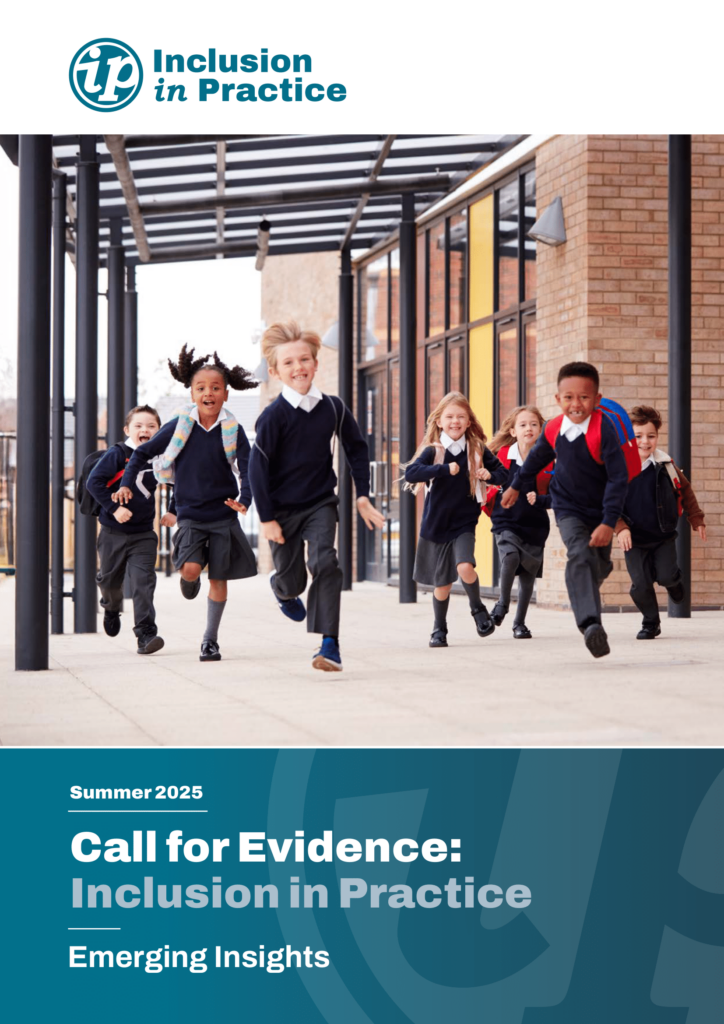Report
Following a national call for evidence to find examples of effective inclusive practice in mainstream schools, Inclusion in Practice and ImpactEd Group have published an emerging insights report laying out five principles of promising practice.
Over a six-week submission period, Inclusion in Practice received 165 institutional submissions, with 820 schools represented through trusts and groups and a further 7,600 schools represented by submissions from providers or local authorities. Researchers from ImpactEd Group facilitated the evidence call and have been analysing the findings.
In a system navigating a complex and challenging funding backdrop, the report details how a number of schools and trusts are successfully organising practice, professional development and resources to strengthen support for all children. The five emerging principles of promising practice identified are:
- Knowing children well, early and often. The foundation of inclusive practice is balancing knowledge of individuals, alongside knowledge of their barriers to learning. Schools are investing time in getting to know children early, particularly at points of transition, and being anticipatory as well as reactive in planning support that will help them succeed.
- High quality and evidence-informed teaching practice. Inclusion starts with expert teaching. When this is embedded consistently and paired with early, targeted support for children, more learners stay in class and make progress.
- Coherent and expert targeted support. Expert and evidence-informed targeted support is organised in clear and structured systems so schools can ensure support is available when needed, and that responsibilities are well understood. Graduated models are enabling earlier, more coordinated responses across settings.
- Strengthening inclusion through relationships and partnerships. Inclusive schools do not work in isolation. Strong relationships based on trust with families, local authorities, and external services help create coherent and consistent support for children.
- Inclusion as a strategic and shared responsibility. Leaders see inclusion as a core priority and principle across their settings, not a separate system. When responsibility is shared and guided by a clear ethos, schools align planning, development, and accountability to drive consistent, inclusive practice.
Whilst the call for evidence illuminates promising themes, it also showed the inconsistency in training, support, evidence-based guidance and resources that schools are navigating. Across submissions, numerous frameworks and tools were cited, alongside a wide range of approaches to training and continuous professional development (CPD) of teams.
Talking about the research Tom Rees said:
“The need for significant reform of the SEND system is well understood and I am grateful that in recent months and through projects like Inclusion in Practice, we have had space to step back and consider what is working and where efforts need to be prioritised.
“This report gives us hope and encouragement, in highlighting pockets of effective and evidence-informed practice being implemented in our schools which we can learn from and build on.
“But this project has also reminded us how much inconsistency exists within the SEND system in terms of frameworks, training, advice and resources.
“We should be ambitious for much better support for teachers and schools in the future.
This means clearer use of evidence, sharper accountability, smarter systems, and putting children’s needs – not labels – at the centre.
“Schools are ready for reform and ready to act. There’s strong appetite to improve – and many schools are already changing how they work. System reform must accompany that and support and build on this momentum.”
Bridget Phillipson, Education Secretary, said:
“Our ambitious reforms will make sure children with SEND have better outcomes through our Plan for Change – with better support in mainstream schools and special school places always there for those who need them.
“Despite the system desperately struggling to cope, there are pockets of outstanding practice already in place in schools that show our vision for reform is possible.
“Thanks to Tom Rees, Ambition Institute and the Confederation of School Trusts for this work, this valuable insight will help more schools begin to create the foundations of this reformed system and we’ll be setting out more details about how this will be achieved in the autumn.”
Hilary Spencer, CEO of Ambition Institute added:
“I am really encouraged by the number of schools who are already taking action to improve inclusion, and very grateful to everyone who shared their work and practice with us.
“We need to make sure that every child has access to expert teaching as a universal foundation for inclusion, with targeted support where it is needed, and specialist support where that is the best solution for the child – all based on high quality evidence about what is effective.
“We hope the principles and examples set out in this report are useful to schools, and we welcome the focus of the Expert Advisory Group on creating strong conditions to make sure children can thrive in an inclusive education system.”
Leora Cruddas, CEO of the Confederation of School Trusts said:
“CST is delighted to have supported the development of this important work. The five insights are a powerful start to our work to define inclusive mainstream practice. We are so grateful to those schools and trusts who contributed to the call for evidence.”
